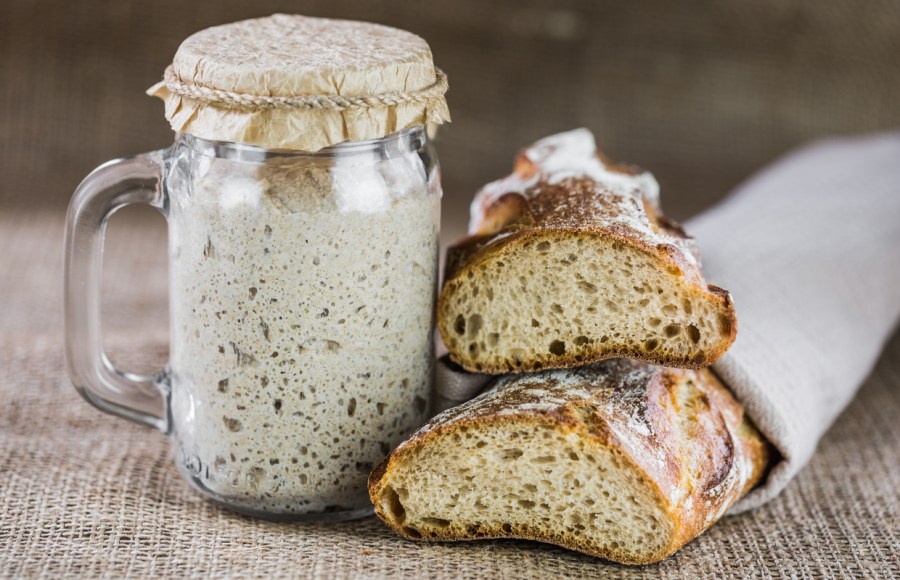Bread gets a bit of a bad rep. While the ultra-processed white loaves you see in supermarkets might not be the best for your gut, ‘real’ bread is another story. We caught up with Jenna Hope, resident nutritionist at Bertinet Bakery, who shares 5 health benefits of sourdough bread…
A traditional, age-old method of baking, Sourdough bread is proof that the best things do take time. The slower fermentation process of sourdough not only promotes better quality taste and texture, it also provides a whole host of health benefits for body and mind.
5 health benefits of sourdough bread

1. Sourdough supports your gut microbiome
According to Jenna, upgrading your choice of bread to sourdough, as part of a healthy balanced diet, is a great way to support your gut microbiome: ‘Sourdough bread contains prebiotic compounds which are required to feed the commensal ‘good’ bacteria in the gut.’ Having a diverse range of good bacteria in the gut is key for mental and physical well-being!

2. Sourdough makes gluten easier to digest
Good news for those with gluten intolerances: the fermentation process in sourdough breaks gluten down to make it easier to digest!
According to Jenna: ‘Throughout the fermentation process of sourdough, enzymatic conversions occur to increase the solubility of gluten and adapt the activity of enzymes in the wheat. As a result, this can make the gluten easier to tolerate in those who are gluten intolerant.’

3. Sourdough is IBS-friendly
Not only does the fermentation process of sourdough break down gluten, but it also reduces the presence of FODMAPs, which can be a trigger for those with IBS.
Jenna explains: ‘The reduction of certain FODMAPs (e.g. oligosaccharides, raffinose and fructans) make sourdough easier to digest than other breads.’

4. Sourdough is a great source of fibre
Getting enough fibre in your diet is essential for healthy, regular bowel movements. Switching to sourdough is also a great way to incorporate a source of fibre into the diet. Jenna adds: ‘In the UK just 13% of men and 4% of women are reaching the recommendations for fibre of 30g per day! The fibre in sourdough has been shown to reduce intestinal inflammation.
‘When fermented, fibre acts as a prebiotic in the gut, producing short chain fatty acids such as butyrate, acetate and propionate, which feed the commensal ‘good’ bacteria optimising gut function and nutrient absorption. Butyrate also promotes the production of white blood cells which are a pivotal player in the promotion of a healthy adaptive immune system.’

5. Sourdough may help to protect against certain health conditions
Research has also shown that the gut is central to various aspects of our health. This includes our immunity, skin, sleep patterns, and mental wellbeing. Our gut can also influence our susceptibility to certain health conditions. According to Jenna: ‘Low levels of bacteria diversity in the gut has been associated with inflammatory bowel disease, celiac disease, Type 1 Diabetes, atopic eczema and psoriasis.’
By eating sourdough, which restores your gut’s microbiome and is easy to digest, you’ll be giving your overall health and wellbeing a boost!

6. Sourdough gives us more nutrients than other breads
Compared to other breads, sourdough bread also gives us access to more nutrients. Jenna explains: ‘The fermentation process of sourdough increases nutrient availability. This means that we can absorb and utilise more of the nutrients from sourdough than other breads.’
Where to buy genuine sourdough bread…
A big aim of the Sourdough September campaign is to educate people on what makes sourdough genuine. Surprisingly, there are a lot of fakes out there!

If you’re looking for the real deal, check out Bertinet Bakery’s sliced softer sandwich-friendly sourdough (from £3.95).
Alternatively, you could head on down to your local bakery to see what they offer. Or, why not try making your own sourdough bread? Click here for a great sourdough starter recipe from Real Bread Campaign.







